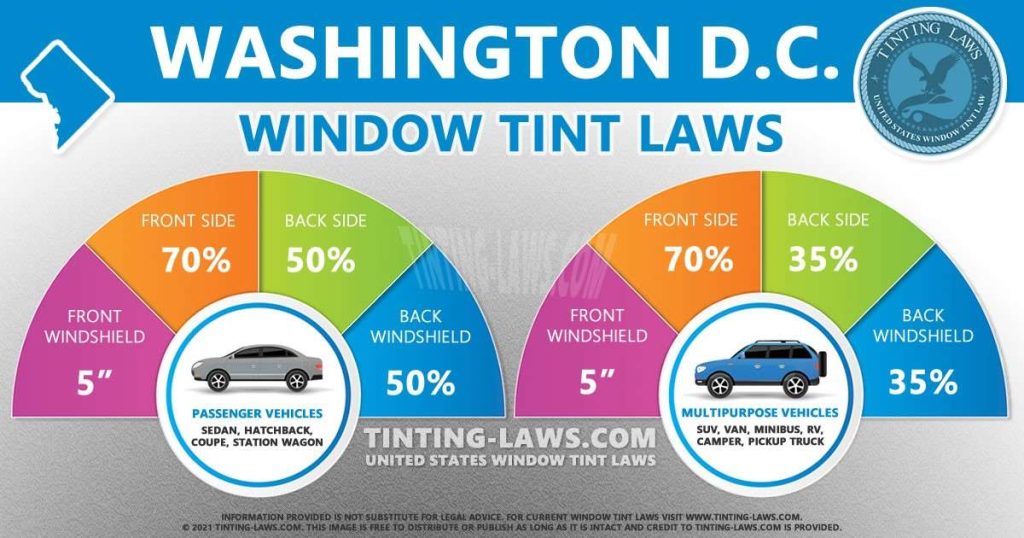Washington D.C. Window Tinting Laws
Car window tinting laws in Washington D.C. were enacted in 1994.
We have provided all the necessary information about your car’s window tint, including how dark or reflective the tint is allowed in your state.
There are also additional car window tinting rules and regulations in Washington D.C. so make sure you read all about it below.
Window tint darkness in Washington D.C.
The percent of visible light allowed through your car windows is called VLT: Visible Light Transmission.
The percentage of light allowed through your film and glass in Washington D.C. is very specific and different for sedan cars and SUV cars or vans.
Tint darkness for sedans:
- Windshield: Non-reflective tint is allowed along the top of the windshield above the manufacturer’s AS-1 line or top 5″
- Front Side windows: Must allow more than 70% of light in.
- Back Side windows: Must allow more than 50% of light in.
- Rear Window: Must allow more than 50% of light in.
Tint darkness for SUV and vans:
- Windshield: Non-reflective tint is allowed along the top of the windshield above the manufacturer’s AS-1 line or top 5″
- Front Side windows: Must allow more than 70% of light in.
- Back Side windows: Must allow more than 35% of light inside.
- Rear Window: Must allow more than 35% of light in.
Window tint reflection in Washington D.C.
Window tint can reflect incoming light and reduce glare and heat.
Washington D.C. window tint law permits a certain window reflection when using a tint so make sure you pay attention to this as well.
Tint reflection for sedans:
- Front Side windows: No reference in current laws.
- Back Side windows: No reference in current laws.
Tint reflection for SUV and vans:
- Front Side windows: No reference in current laws.
- Back Side windows: No reference in current laws.
Other Washington D.C. window tint rules and regulations:
Washington D.C. does have several other important laws, rules and regulations pertaining to window tinting. They include the following:
- Side Mirrors: No restrictions.
- Restricted Colors: No tint colors are explicitly forbidden.
- Certificates: Tint certificates are not required in District of Columbia.
- Stickers: No sticker to identify legal tinting is necessary.
- Medical Exceptions: Washington D.C. Medical waivers are permitted, consult your local DMV for further info.
- Penalties: $50 citation. Up to $1000 fine if not in compliance after 5 days.
Keep in mind that Washington D.C. tinting laws and regulations may be interpreted differently in your county or place of residence.
We always recommend double-checking our information with your local DMV or law enforcement authorities.

Our information about window tint laws in Washington D.C. was last updated in 2024.
Tinting laws in Washington D.C. were enacted in 1994.
In case any of our info provided is not up to date or correct be sure to contact us so we can fix it. Thanks!
Trusted industry leader in providing accurate window tint laws. Share with confidence:
State of Washington D.C. Info
Washington, D.C., formally the District of Columbia and commonly referred to as Washington, “the District”, or simply D.C., is the capital of the United States.

Capital: Washington, D.C.
Population: 712,816
Area: 68.3 sq miles (176.9 km²)
Tint law references:
Code of the District of Columbia – § 50–2207.02. Tinted windows prohibited
Medical exemption info:
DC DMV – Medical Waivers for vehicle window tinting restrictions